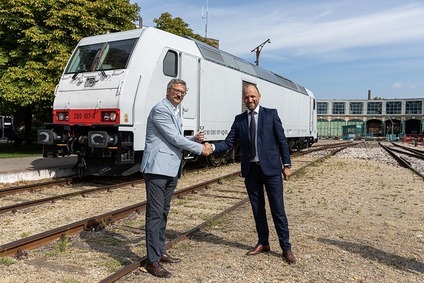
The first high-performance equipment arrived at the market-leading Hungarian rail freight company and its keys were symbolically received today by Norbert Körös, Member of the Board and CEO, from Patrice Bildstein, Deputy Managing Director & Europe Sales Director, representing AKIEM. An additional locomotive of the same model will arrive soon, aand three more will be delivered by July 2022. The locomotives will be utilised in the area of Debrecen and Miskolc with the purpose to provide shunting services on industrial tracks. The two companies have concluded a lease agreement for five years covering also maintenance activity and its costs.
On the occasion, Norbert Körös stated: ‘Operating the TRAXXs will allow more efficient, higher quality customer and train forwarding services for Rail Cargo Hungaria, therefore, we consider leasing AKIEM diesel locomotives as a profitable investment in the long run. Due to more efficient vehicles, this construction allows us to perform the same tasks with less assets and personnel’. The CEO reminded at the same time that RCH began expanding its own diesel fleet a year ago, increasing its capacity by putting high-performance TRAXXs into service in addition to the shunting locomotives No 2068 with a lower capacity being still in operation, hence improving the efficiency of its shunting operation. Finally, he stressed: The performance of the leased vehicles will contribute to maintain single wagon load services provided nationwide by Rail Cargo Hungaria’.
Manufactured in 2008, the performance of these four-axle F140DE TRAXXs is 2200 kW and they have a starting tractive effort of 270kN, a maximum speed of 140km/h and weigh 82 tonnes. The machines have a better constructed engine than our locomotives used so far, they are more efficient and have a lower emission of pollutants. Their operation will enable us to reduce our fuel consumption by at least 10% on an annual basis, hence burning 105,000 litres less diesel oil and reducing CO2 emissions of our company by about 278 tonnes.
